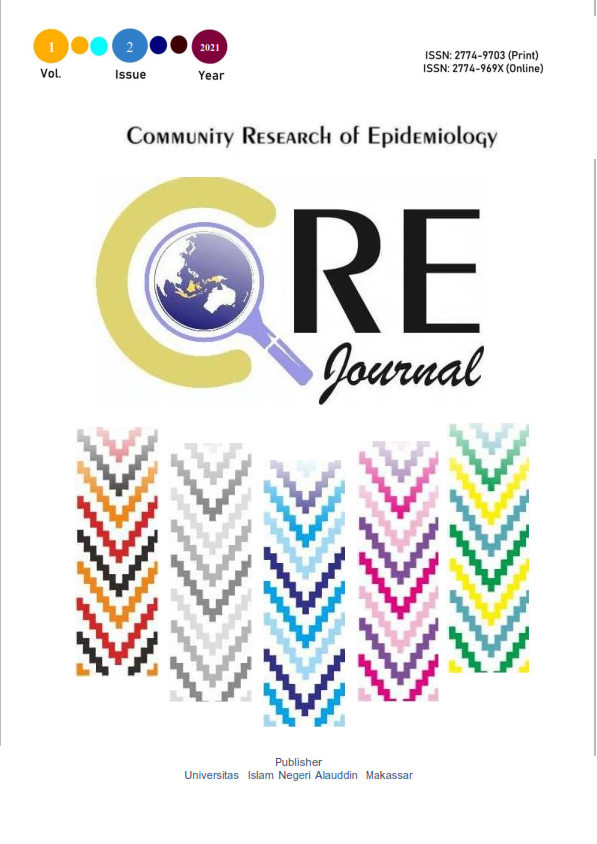Relationship between knowledge and fast food with obesity in adolescents
Abstract
Obesity is a risk factor of degenerative diseases which is a public health problem that covers almost the entire life cycle including adolescents. Consumption of fast food is suspected as one of the triggers of obesity in adolescents. Purpose: The purpose of this study was to find out the relationship of knowledge and fast food consumption with the incidence of obesity among adolescents in Kendari City, 2021. Method: A quantitative study with cross sectional design was conducted in December 2021 in the Kendari City area, Southeast Sulawesi. The results of the study: based on bivariate analysis showed that of 397 samples of good fast food diet as many as 151 people (38%) normal category and as many as 86 people (21.27%) who have a very good diet category normal and about 23 people (0.3%) have a diet that is not good category obesity. Based on bivariate analysis after conducting a statistical test with the Chi-Square test obtained p= =0,538> 0.05 for knowledge and p = 0.007 < 0.05 for fast food consumption. Conclusion: So it can be concluded that there was not relationship between knowledge with the incidence of obesity in adolescents and there was a significant relationship between fast food consumption with the incidence of obesity in adolescents.
References
Ali, R., & Nuryani. (2018). Sosial Ekonomi, Konsumsi Fast Food Dan Riwayat Obesitas Sebagai Faktor Risiko Obesitas Remaja. Media Gizi Indonesia, 13(2), 123-132.
Bhaswara, A.A.G &Saraswati M.R. (2018). Hubungan status sosial ekonomi keluarga dengan kegemukan pada remaja SMA di Denpasar. E-Jurnal Medika Udayana. Vol. 7 No. 3, Maret, 2018:99-106.
.Andrasili, J&Saraswati, M.R. (2018). Hubungan antara Tingkat Pengetahuan Gizi terhadap Terjadinya Obesitas pada Anak SMA di Denpasar. E-Jurnal Medika. Vol 7. No.7, Juli, 2018.
Dewi, P.L.P & Kartini, A. (2017). Hubungan Pengetahuan Gizi, Aktivitas Fisik, Asupan Energi, dan Asupan Lemak dengan Kejadian Obesitas pada Remaja Sekolah Menengah. Journal of Nutrition College. Vol 6. No. 3 Tahun 2017, Hal 257-261.
Dewi, A., Sulreni, I.N & Ningsih,M.S. (2023). Faktor-Faktor yang Berhubungan dengan Kejadian Obesitas Pada Siswa MAN 1 Kota Padang. SEHATMAS (Jurnal Ilmiah Kesehatan Masyarakat). Vol. 2 No. 1 (Januari 2023) 159-171.
Kemenkes. (2019). Epidemi Obesitas.
Notoatmodjo. (2010). Ilmu Perilaku Kesehatan. Jakarta: Rineka Cipta.
Paramita, K.A.T, Indonesiani, S.H & Gede, L. (2023). Hubungan Aktivitas Fisik dengan Kejadian Obesitas pada Remaja SMAN 4 Denpasar Selama Masa Pandemi Covid-19. Aesculapius Medical Journal. Vol. 3 No.1 | Pebruari | 2023 | Hal. 117 - 123
Putri, L. (2017). Faktor Faktor Yang Berhubungan Dengan Konsumsi Fast Food Pada Remaja Obesitas Di Sma Theresiana 1 Semarang Tahun 2017. Jurnal Kesehatan Masyarakat
Riani, P,. Ahmad, A &Ismail N. (2021). Faktor Risiko Obesitas Pada Remaja: Studi Case- Control. Nasuwakes: Jurnal Ilmiah Kesehatan. Vol: 14, No: 1, April 2021.
Simpati, R., & Sugesti, R. (2021). Pengaruh Konsumsi Fast Food, Asupan Sarapan Pagi dan Aktivitas Fisik terhadap Kejadian Obesitas pada Remaja Putri. Simfisis Jurnal Kebidanan Indonesia, 01(01).
Telisa, I., Hartati, Y & Haripamilu, A.D. (2020). Faktor Risiko Terjadinya Obesitas Pada Remaja SMA. Faletehan Health Journal. 7 (3) (2020) 124-131.
Widyastuti, D. A., & Sodik, M. A. (2018). Pengaruh Kebiasaan Konsumsi Junk Food Terhadap Kejadian Obesitas Re


